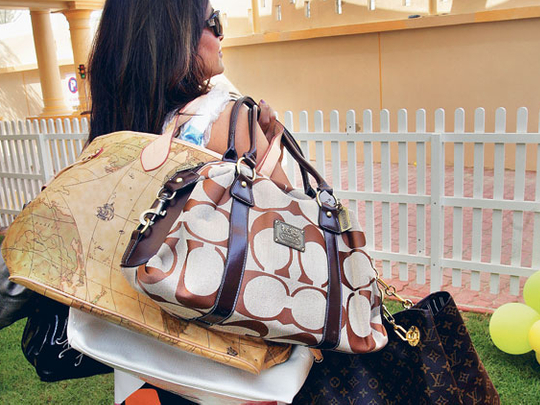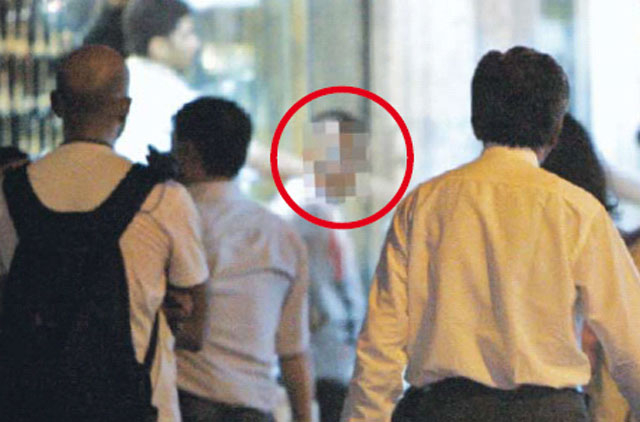
Dubai: For a covert business operation, this is a fairly open affair. It's 7.45pm on a hot August evening and Bur Dubai's Meena Bazaar is teeming with shoppers.
"Designer bags chahiye (want)? Gucci, Prada, Louis Vuitton?…Watches…Rolex , Rado? Aaiye (Come) Sir, Madam," a salesman approaches us as a colleague and I walk past a street corner. It's a well-rehearsed invitation, issued to any passer-by deemed to be a potential customer.
We agree to go along even as a clutch of other salesmen - some five to six of them - beckon us from a bylane a few metres away. The first salesman makes sure we are with him as he leads us to a nearby apartment block.
There's nothing amiss until we arrive at a closed door on the first floor. As our escort opens the door furtively, we notice four locks on the inside. Next to a table is a CCTV, its vigilant split screens leaving nothing to chance.
We realise we have stepped into a den of fake branded luxury items. From travel bags and handbags to wallets, belts, watches and other accessories, every label worth its name can be found in the two-room apartment.
The variety is huge.
As it emerges, this place is only the tip of the iceberg in what is a thriving market for fake goods in the UAE. Studies estimate that the size of the counterfeit market in the country is around $6.27 billion (Dh23 billion) with operators functioning not just from behind closed doors and sundry outlets in the lanes and bylanes of areas like Bur Dubai, Deira and Karama but also from some of the swankiest malls in town and other emirates.
Sources concede the proliferation of counterfeit luxury items in the country is so deep that it is practically impossible to wipe out the menace. Although a criminal offence punishable by fines and imprisonment under the law , sources admit there are many challenges in fighting the unlawful practice.
High demand for fakes
For one, there is a growing demand for designer fakes among customers. Genuine brand owners also have to contend with other deterrents like complex procedures for getting complaints redressed, high cost of initiating regulatory and legal action, insufficient damages and penalties, difficulties in identifying targets and inability to strike at their international roots.
Khalifa Hareb, Director, Assets Management, Dubai Municipality, said the public must conduct due diligence before they buy any product. "They must be informed and be careful not to buy illegally sold products."
Taj Paul, intellectual property rights lawyer with Dubai Media City firm The Rights Lawyers, who deals with 10-15 counterfeit infringement cases in a month, says the police cannot take suo moto action unless a brand is registered and its owners file a complaint after identifying targets for raids. But often, nimble operators vanish within hours of brand owners identifying them to inform the authorities, she said.
The cost of initiating action is invariably higher than the damages received which is why many brand owners shy away from going to the authorities. "The decision of how critical it is for the brand owner to act comes down to doing a cost-benefit analysis," says Paul, explaining that the official fee for filing a civil case to claim damages is 7.5 per cent of the claim or a cap of Dh30,020. Additionally, there are expenses involved in getting documents legalised and translated into Arabic, besides the local lawyers' fee, all of which could add up to a huge amount, she adds.
Long process
Initiating action at the courts or at the regulatory level with the help of Dubai Customs, the Dubai Economic Department and the police entails considerable time and effort.
Omar Shteiwi, Regional Intellectual Property Advisor, Nestle Middle East and Chairman of the Board of the Brand Protection Group, says, "Many brand owners want more transparency in dealing with the problem. They also want greater cooperation between stakeholders so that anti-counterfeiting strategies are more streamlined."
Sources say brand owners get discouraged from filing a complaint as it takes about a year for it to be processed. Moreover, they feel the penalties - of up to Dh50,000 and imprisonment of one year - for those convicted of counterfeiting are too small for a criminal offence.
Such deterrents, they say, only embolden these operators.
At the apartment we visited, a sheepish-looking salesman showing us a white Louis Vuitton handbag admits that it's fake. "Jo brand chaahiye aapko milega [you will get whatever brand you want]," he boasts.
His colleague, catering to two other customers from behind a table interrupts our conversation. He has a lighter in his hand and he runs the flame across the bag. We realise it is a test of fire for the ‘genuineness' of the fake product as we see other salesmen doing it with other bags.
The man tells us the bag is pure leather and hence will not go up in flames. He also draws our attention to the little details in the bag such as the cloth lining inside and the ‘Made in France' tag, both of which seem identical to the original product.
"How much does it cost?" I ask, but I am told to first select the item and we can talk of the price later. I insist on the price and the first salesman tells me [their] LV bags cost anywhere between Dh350-Dh500 as against Dh4,000-Dh15,000 for the originals. "But don't worry, we will give you the right price," he says, leaving room for negotiation.
The tourists in the adjoining room are striking a bargain even as two other women customers walk in. "We get many Indian customers who buy 10-15 bags to gift back home," says one of the salesmen, adding that the products are sourced from Korea.
My colleague takes a look at an array of watches, all priced between Dh500-Dh600. We are told that Rolex, Rado and Casio are the hot favourites and the watches sold come with a one-year warranty.
We are not convinced, so we get back to the bags. I notice a camelskin coloured Jimmy Choo purse and a Coach wallet even as my colleague picks up an Armani office bag.
We ask for the price but the salesman is again elusive.
We prepare to leave but the man thrusts the wallet upon us. He also has Jimmy Choo and Armani bags in his hand. Take all of it for Dh500, he urges us, but we walk off.
When we come out, another salesman in the bylane runs up to us. "We have another shop with more designer bags…" he tells us. But this time, we aren't listening.
9,489 raids
Luxury brands like Louis Vuitton are amongst the most widely imitated in the world, including the UAE.
In a statement to XPRESS, the company's Corporate Press Department said, "In 2009, Louis Vuitton initiated 9,489 raids (39 per day) and 26,843 anti-counterfeiting procedures worldwide, resulting in the seizure of thousands of counterfeit products and breaking up of criminal networks."
More than 430 litigious websites were shut down during the year, it said.
The brand's intellectual property department manages over 11,500 intellectual property rights, including trademarks, designs and copyright with the support of 250 agents and it has a dedicated team of lawyers and former law enforcement professionals in Paris and other key cities, including Dubai, where thousands of anti-counterfeiting raids are performed each year, the statement said.
"The sale of counterfeit goods is a serious offence whose revenues fund criminal organisations at the expense of consumers, companies and governments. It calls for responsible behaviour of all economic actors, in particular consumers on the internet, now a favoured platform for counterfeit sellers," it added.
Are they getting away too lightly?
The counterfeit menace, sources say, cannot be effectively dealt with unless the penalties are more stringent. The Dubai Economic Department currently levies fines between Dh5,000 and Dh50,000 for violations concerning commercial fraud and trademark infringements.
For example, importation, bringing in, buying from unlicensed vendors, or selling of fake/counterfeit goods in Dubai attracts fines of Dh5,000, Dh15,000 and Dh20,000 on the first, second and third violations.
Similarly, manufacturing, offering for sale, or selling packaging materials or containers to be used for sale of fake/counterfeit goods/products attracts fines of Dh15,000, Dh30,000 and Dh50,000 for repeated offences.













